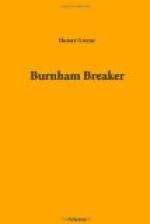The judge came in from a side door and took his seat on the bench. Beneath him the prothonotary was busy writing in a big book. Down in the bar the attorneys sat chatting familiarly and pleasantly with one another. Sharpman was there, and Craft was at his elbow.
Goodlaw was there, and Mrs. Burnham sat in her accustomed place. The crier opened court in a voice that could be heard to the farthest end of the room, though few of the listeners understood what his “Oyez! oyez! oyez!” was all about.
Some opinions of the court were read and handed down by the judge. The prothonotary called the jury list for the week. Two or three jurors presented applications for discharge which were patiently considered and acted on by the court.
The sheriff arose and acknowledged a bunch of deeds, the title-pages of which had been read aloud by the judge.
An attorney stepped up to the railing and presented a petition to the court; another attorney arose and objected to it, and quite a little discussion ensued over the matter. It finally ended by a rule being granted to show cause why the petition should not be allowed. Then there were several motions made by as many lawyers. All this took much time; a good half-hour at least, perhaps longer.
Finally there was a lull. The judge was busily engaged in writing. The attorneys seemed to have exhausted their topics for conversation and to be waiting for new ones.
The jury in the Burnham case sat listlessly in their chairs, glad that their work in the matter at issue was nearly done, yet regretful that a case had not been made out which might have called for the exercise of that large intelligence, that critical acumen, that capacity for close reasoning, of which the members of the average jury feel themselves to be severally and collectively possessed. As it was, there would be little for them to do. The case was extremely one-sided, “like the handle on a jug,” as one of them sententiously and somewhat scornfully remarked.
The judge looked up from his writing. “Well, gentlemen,” he said, “are you ready to proceed in the case of ’Craft against Burnham’?”
“We are ready on the part of the plaintiff,” replied Sharpman.
Goodlaw arose. “If it please the court,” he said, “we are in the same position to-day that we were in on Saturday night at the adjournment. This matter has been, with us, one of investigation rather than of defence.
“Though we hesitate to accept a statement of fact from a man of Simon Craft’s self-confessed character, yet the corroborative evidence seems to warrant a belief in the general truth of his story.
“We do not wish to offer any further contradictory evidence than that already elicited from the plaintiff’s witnesses. I may say, however, that this decision on our part is due not so much to my own sense of the legal barrenness of our case as to my client’s deep conviction that the boy Ralph is her son, and to her great desire that justice shall be done to him.”




